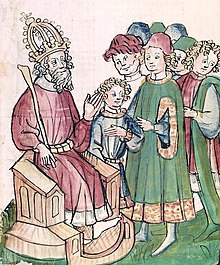Seven Wise Masters
The Sultan sends his son, the young Prince, to be educated away from the court in the seven liberal arts by Seven Wise Masters.[6] Travelling from the east by way of Arabic, Persian, Syriac and Greek, the work was translated from Greek into Latin in the 12th century by Jean de Hauteseille (Joannes de Alta Silva), a monk of the abbey of Haute-Seille near Toul, with the title of Dolopathos (ed.[1] The German, English, French and Spanish chapbooks of the cycle are generally based on a Latin original differing from these.The most important of these is The Sevyn Sages by John Rolland of Dalkeith edited for the Bannatyne Club (Edinburgh, 1837).[1] The German adaptions of the Seven Sages tradition can be divided into several verse and prose versions, most of which follow the latin Historia but sometimes change the order or selection of the embedded tales.See: The Seven Sages Society, founded in 1975, maintains a perpetual scholarly bibliography, with annual updates in its on-line and printed (free of charge) newsletter.
Seven Sages (disambiguation)SanskritPersianHebrewSultanSindibadframe narrativeIndian philosopherSyntipasJosephSyriacNakhshabiTutinamaArabicJean de HauteseilleDolopathostrouvèreRoman des sept sageschapbooksJohn RollandGesta RomanorumGiovanni BoccaccioDecameronWynkyn de WordeGaston ParisSociété des anciens textes françaisGeorg BüchnerDomenico ComparettiAarne–Thompson–UtherThe Three LanguagesThe Book of the Wiles of WomenChisholm, HughEncyclopædia BritannicaW. A. CloustonJacobs, Josephpublic domain